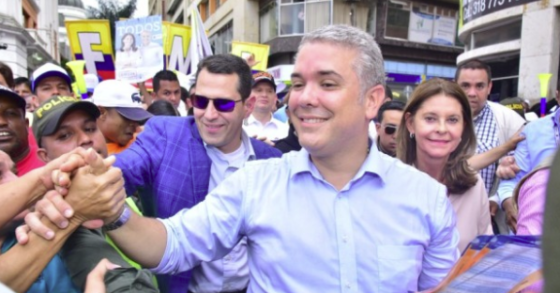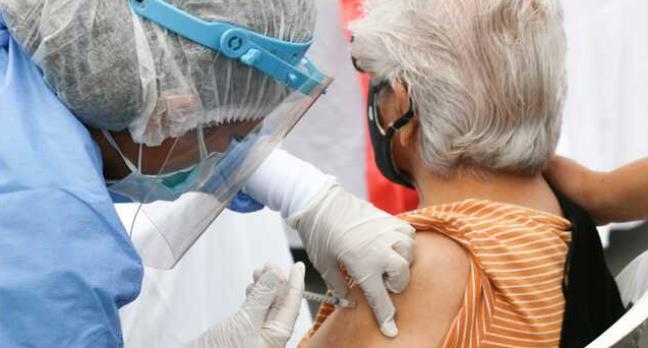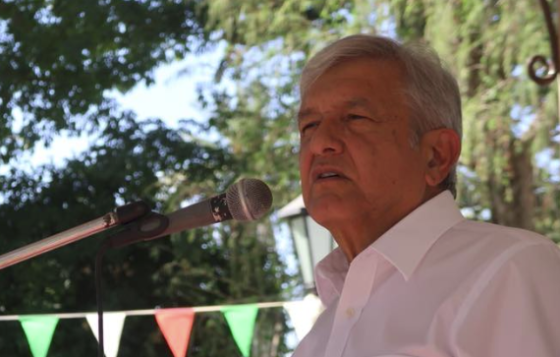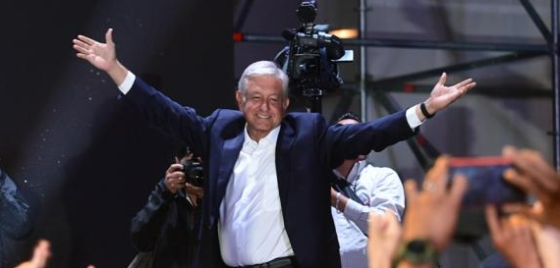
Will Colombia’s New President Deliver on His Promises?
Iván Duque, a conservative former senator, on Sunday won Colombia’s presidential runoff election. What does it mean for the country?
A Daily Publication of The Dialogue
U.S. President Joe Biden and G7 leaders in June committed to donating more than one billion Covid-19 vaccine doses for the world, including Latin American and Caribbean countries, with more than 500 million doses coming from the United States. How significant is the announced donation by the G7? To what extent has Latin America’s slow vaccine rollout been affected by a limited supply of doses, and do countries in the region have the necessary logistics and financial resources in place to make sure the shots are administered? As inoculation advances in the region, what is the most likely timetable for back-to-normal protocols and the expected pace of economic recovery?
Mauricio Claver-Carone, president of the Inter-American Development Bank: “The G7’s commitment to donate vaccines to poor countries, including in Latin America and the Caribbean, is a welcome and very important step toward the region’s recovery. In recent weeks, the region has suffered from about 150,000 new daily Covid cases and more than 4,000 daily deaths. South America has eight times the world’s death rate. These are some of the worst numbers since the pandemic began, which is why the IDB has taken numerous initiatives to speed up equitable vaccine distribution. More than a third of all new Covid cases are in our region, which accounts for 32 percent of worldwide deaths, even though it represents 8 percent of the world’s population. This health crisis has led to the worst economic crisis in 200 years. The region urgently needs vaccines. Only 21 percent of its population has received at least one dose—half the level of OECD countries—and reports show that essential second doses are lagging. We must do more to speed up vaccine distribution on an equitable basis. Helping countries to obtain and administer vaccines is part of Vision 2025, the IDB’s broader plan to help the region recover from the pandemic and usher in an era of sustainable growth. The IDB both appreciates and supports the G7’s commitment, which adds to our own vaccine work in the region. Our vaccine support is part of a broader response; we approved a record $21.6 billion in new financing across sectors and a $1 billion program to help borrowing member countries buy and distribute vaccines. We are also helping countries with storage, transportation and logistical issues, as well as with vaccine communications campaigns. We have helped 10 countries acquire and finance the purchase of vaccines. We are also the first multilateral development bank to offer an indemnity guarantee instrument to help governments negotiate vaccine deals with pharmaceutical companies. Getting people vaccinated is of paramount importance, not just to keep people healthy, but also to ensure that the region’s recovery begins as quickly and as equitably as possible.”
Katherine Bliss, senior fellow at the CSIS Global Health Policy Center: “The G7 pledges to donate millions of doses of Covid-19 vaccines are an important demonstration of political commitment but fall far short of what is truly needed to scale up and equitably distribute vaccines globally. Most countries in Latin America and the Caribbean have joined Covax, the vaccine pillar of the global Access to Covid-19 Tools (ACT)-Accelerator, either through the Advance Market Commitment (AMC) for lower-income countries or by self-financing purchases of Covid-19 vaccines through the facility. But Covax-procured doses have been slow to arrive because the surge of cases in India, where many of the Covax shots are produced, led to a slowdown of vaccine exports that is likely to continue over the next few months. Beyond Covax, many countries in the region have been unable to negotiate purchase deals with vaccine manufacturers, leading some to turn to vaccines that the WHO has not yet approved. While Bermuda, Chile and Uruguay have managed to reach relatively high vaccine coverage, more populous countries, including Brazil, Mexico and Colombia, are struggling to meet the needs of their populations. The fact that the region has a strong track record of delivering routine immunizations to children bodes well for the distribution of Covid-19 vaccines once they are available, but health systems must ensure that adequate financing, communications and training are in place to adapt existing programs to serve adults, and people must have confidence in the vaccines and be willing to receive the shots, as well.”
Julio Frenk, president of the University of Miami and former secretary of health of Mexico: “The donation announced by the G7 is a very welcome decision—one that demonstrates global solidarity and U.S. leadership in the fight against Covid-19. This is also enlightened self-interest, as we have seen over the past 16 months that no country is safe until every country is safe. However, there is a difference between vaccines and vaccination. Because Latin America and the Caribbean is a heterogenous region, there are stark differences among countries with respect to both vaccine supply and health system capacity. To win the race against variants—especially the more contagious Delta variant—countries must accelerate the pace of vaccination. For instance, Mexico is securing the necessary doses of vaccines. Its main goal now should be to vaccinate 80 percent of the adult population and a significant proportion of adolescents ages 12-18 before the start of winter and its anticipated spike in cases. It is concerning that prior to this month’s elections, Mexico was able to deliver one million vaccines per day, but this number has dropped considerably afterwards. The good news is that, although the current administration has weakened its once-robust vaccination system, it is still capable of delivering the necessary inoculations to its population. The question is whether its government will make doing so its top priority.”
Arachu Castro, Samuel Z. Stone Chair of Public Health in Latin America at Tulane University’s School of Public Health and Tropical Medicine: “The world needs 11 billion vaccine doses as soon as possible to reach herd immunity, and the G7, in a largely complacent fashion, has committed a meager 9 percent of this figure between now and next year. The pandemic will continue to take many more human lives and livelihoods at this slow pace of pledges, and further divide us between the vaccinated and the rest. In Latin America and the Caribbean alone, we still need at least 652 million doses to reach that immunity threshold. Moreover, like most matters in the region, the distribution is highly unequal: while Chile and Uruguay have successfully deployed vaccines, not a single dose has yet reached Haiti. To speed vaccine distribution, patent waivers and technology transfer agreements should be front and center of any serious discussion to end the pandemic, in addition to speedy donations. In sum, one billion doses fall short of a real commitment of solidarity with the unvaccinated world.”
María Luisa Ávila, chief of the infectiology department at the National Children’s Hospital in San José and former Costa Rican health minister: “The G7 leaders ended the summit in Cornwall with an ambitious agreement: the donation of one billion Covid-19 vaccines to developing countries. However, their ‘generosity’ comes late. According to the Goalkeepers 2020 report of the Gates Foundation, through data modeling from Northeastern University, the equitable distribution of a vaccine against Covid-19 would have prevented 61 percent of deaths versus 33 percent that it would avoid by vaccinating high-income countries first. The Covax mechanism will be used to distribute part of the donated vaccines. From its conception, Covax was intended to promote equity and solidarity. However, it failed to fulfill its objective, as it was subject to the ‘will’ of rich countries, which monopolized a large part of global vaccine production. The United States, according to data from Duke University, by August 2020 had secured 800 million doses through seven agreements with six companies. The United Kingdom did the same with five agreements that would allow it to vaccinate 225 percent of its population. Vaccines should be a good of humanity; the pandemic does not recognize borders, so vaccines should not either. To stop the pandemic, the WHO has suggested that it is necessary to vaccinate at least 70 percent of the world’s population. It is necessary to rethink the distribution and production of vaccines with an equity dimension in the face of future health emergencies; otherwise, no country will be safe. In an interrelated world, public health solutions must be global, not fragmented.”
 The Latin America Advisor features Q&A from leaders in politics, economics, and finance every business day. It is available to members of the Dialogue’s Corporate Program and others by subscription.
The Latin America Advisor features Q&A from leaders in politics, economics, and finance every business day. It is available to members of the Dialogue’s Corporate Program and others by subscription.
Iván Duque, a conservative former senator, on Sunday won Colombia’s presidential runoff election. What does it mean for the country?
Mexicans go to the polls on Sunday, July 1, for the country’s presidential, legislative and local elections. What can we expect?
Leftist Andrés Manuel López Obrador swept to victory Sunday in Mexico. What changes are in store?
 Much of Latin America has experienced a slow rollout of Covid-19 vaccines. // File Photo: Peruvian Government.
Much of Latin America has experienced a slow rollout of Covid-19 vaccines. // File Photo: Peruvian Government.

